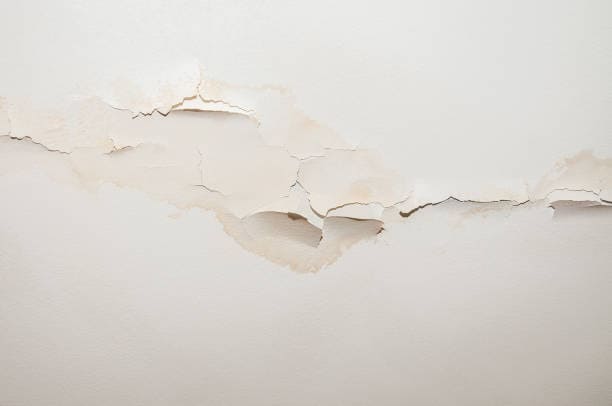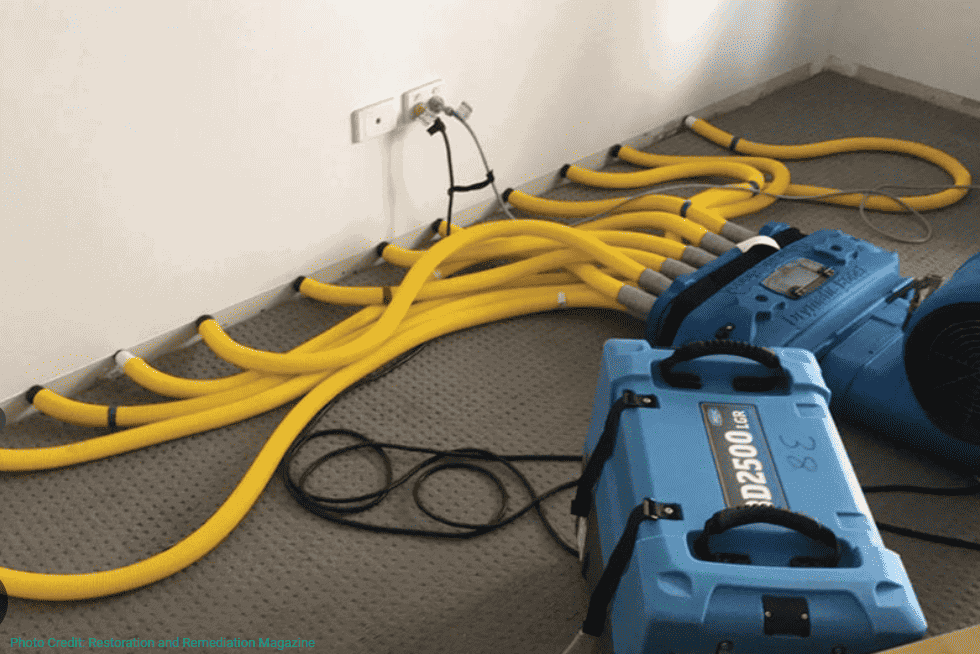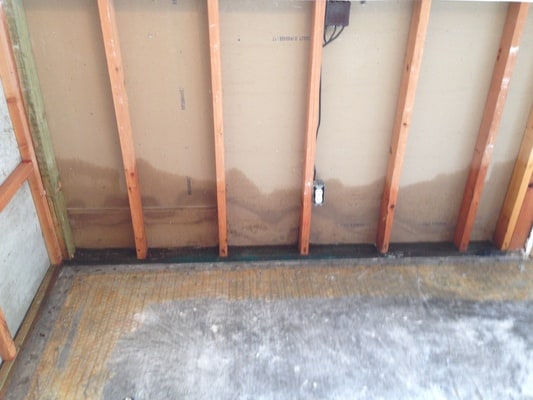The idea of water damage in walls can be stressful and scary, and cause a lot of uncertainty! How do you know if there really is water in your walls? What can you do about it? Will you have to call anyone? Who?
All these questions and more are answered right here, by a professional water damage mitigation company, so that you’re empowered with confidence to know what’s going on, what to look for, and what to do.
Table of Contents
- Can Water Get Into Walls?
- What Happens if Water Gets In Your Walls?
- What Does Water Damage In a Wall Look Like?
- How to Fix Water Damage in Walls
- Who to Call for Water Damage in Walls
- Does Insurance Cover Water Damage in Walls?
- Key Takeaways
- More Resources
- If You Reside in Western Washington State
Can Water Get Into Walls?
Yes, water can definitely get into walls! Drywall is absorbent, which is why we usually seal it off with water-resistant paint, baseboard and trim, and caulk. But sometimes, water can still get in.
In our experience, water most often gets into walls when there’s a minor flood on your property. It’s usually a toilet or bathtub overflowing, or a large water spill. It could also be a broken washing machine or dishwasher pipe that seeps water all over the floor. Even when the water is cleaned up off the floor, most people don’t realize that the walls may have soaked up some of that water!
Another common scenario we see is if there is a pipe in your walls that has been dripping for a long time. All that water stays inside the wall! This usually also leads to mold, which is why a lot of water damage mitigation companies like Cleaner Guys also specialize in mold remediation.
But regardless of how the water got into your walls, it can cause all sorts of problems down the line.
What Happens if Water Gets In Your Walls?
If water gets in your walls, it almost always causes mold to grow. Depending on the amount of water, it can also soak into the wooden framing inside the walls, causing the wood to swell and bend!
How does water damage in walls cause mold to grow? There are 4 things that create an ideal growing place for mold: moisture, darkness, warmth, and organic material to feed on. The inside of your walls has all of that! It’s dark, water damage makes it moist, mold loves to feed on drywall and wood, and it’s warm and cozy. Read more about other places mold likes to hide in your house here.
Mold in your walls can also often cause mold sickness. This can be a big risk, as you can read here in this article from the United States EPA. We also cover the topic of mold sickness in our other professional articles here and here.
What Does Water Damage in a Wall Look Like?
Signs of water damage inside a wall usually include brown stains around the area, paint bubbling or cracking, and sometimes funky, gross odors near a certain wall. The drywall can sometimes also be soft and squishable to the touch.
You may observe any combination of these signs, not necessarily all of them. We will note, however, that if the only sign you notice is a musty odor in some area(s) of your property, that is a very strong sign that there is mold inside your walls somewhere. And usually, mold comes from moisture, so there may be an undiscovered water problem as well.

How to Fix Water Damage in Walls
In most cases, unfortunately, water damage inside your walls is not something you can fix yourself. This is because the techniques required to successfully repair the damage are techniques only professionals can perform. There are 2 standard ways to fix water damage in a wall: dry it out, or replace it.
Sometimes, the damage done by the water is minimal enough that the drywall can be safely dried out! Drying out the cavity inside of intact walls requires a special piece of equipment that only certified professional mold remediation companies use (pictured below). It’s essentially a commercial-grade high-power fan, with many tubes attached to it. These tubes are stuck into small holes drilled into the drywall, blowing high-powered air directly into the wall cavity! This is the only way to safely preserve the drywall intact.

If it is not possible to dry out the water-damaged drywall and keep it intact, then all the water-damaged drywall must be removed by a certified water damage mitigation company. This also requires careful, skilled work, and it is not something that should be DIYed. Click here to read more about the water damage mitigation process.
Who to Call for Water Damage in Walls
If the water damage was caused by some kind of plumbing accident in your home, the first person you called was a plumber. They’re the ones who should stop the source of the water. The second call you should make is to your insurance company (read more about that in the next section).
The third call you should be making is to a reputable water damage mitigation and restoration company, like Cleaner Guys. These professionals are the only ones with the training and equipment to properly and safely remove the water damage from your home. If you’re unsure how to find a trustworthy, reliable company to do this, read this article.
Does Insurance Cover Water Damage in Walls?
Cleaner Guys is a professional water damage restoration company; we are not an insurance company. Therefore, we can’t give legal advice for your specific situation. However, we have been working with all the major insurance companies for decades. We’ve found that usually, they will help cover the cost of the repair, if the water damage was sudden and/or accidental. For example, this is the water damage policy of Allstate Insurance, a common choice for insurance.
But to get the real details on whether insurance will cover your damage… call your insurance company and ask!
Key Takeaways
In conclusion: water damage in walls is definitely a serious problem. It can lead to mold growth, instability of the structure of your home, and more. You can often tell if there is water damage in your walls if the paint is bubbling, cracking, or peeling, if there are brown water mark stains on the walls around where the water accident was, if the drywall is soft to the touch, or if there are musty odors coming from that area of wall. Call your insurance company to find out what their policy will be for covering your specific water damage. It is not advisable to try to fix it yourself. This is a situation where you really should leave it up to the professionals to fix it for you.
More Resources
Here are some additional resources you may find useful for your journey to a fully-restored home!
How to find a reputable, trustworthy restoration company →
How to deal with mold if you live in an apartment →
How to find a water damage restoration company with 24/7 service →
Recognizing mold sickness (which may occur if you have water damage in your walls) →
If You Reside in Western Washington State
If you are anywhere north of Seattle in Western Washington State, consider Cleaner Guys as one of the wisest choices for your water damage restoration company. We’ve risen to be one of the most popular and well-loved in the area! This is because of our award-winning customer service and our commitment to better prices than the other companies. It’s also because of our high standards for quality work and professionalism.
If you need water damage restoration in Mount Vernon WA, and you don’t know who to call, give us a call today!
Disclaimer: This article is for informational purposes only. No part of this article is medical or legal advice, and may not be used as such. For all serious medical matters, consult your doctor. For all serious legal matters, consult your legal advisor. This article contains Cleaner Guys’ experience and opinions only.



This Post Has One Comment
I find it alarming that water leaks could spread into the walls of your property and cause damage if left unattended. I can see how hiring experts who can restore your property after a damaging water incident is a good investment. I will keep this in mind since I plan to move into a storm-prone area next year with my wife.